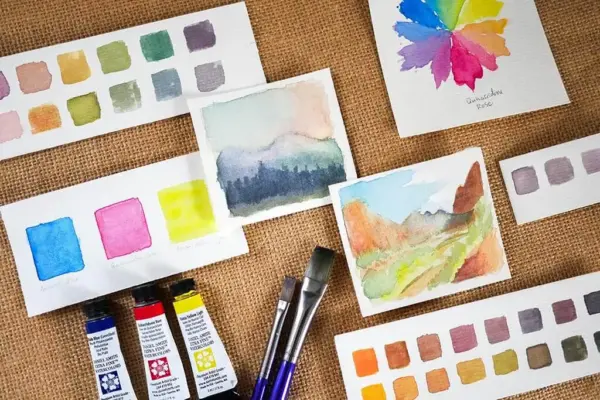Color Mixing in Water Color Art: An artist’s skill in mixing colors is very important in watercolor art, it is a beautiful way to express yourself. No matter how experienced you are as a painter, or how new you are to watercolor painting, learning to mix colors can take your art to a whole new level.
get started
Mixing colors is one of the most important skills you need to achieve many different things in watercolor art. By mixing and matching colors, artists can express their feelings, give their pieces more depth and make them more colorful.
Main colors used in watercolor painting
When painting with watercolor, the main colors are red, blue and yellow. These colors can be made in many different shades and shades. When artists learn to use basic colors well, they can control their range and lay the foundation for more complex color mixing.
Secondary colors and how to mix them
Secondary colors appear when you mix basic colors. Colors such as orange, green and purple are background colors in watercolor art. Different mixing methods, such as wet on wet and wet on dry, give artists different results, which makes them artistic.
How to read the color wheel
The color wheel is an important tool for the watercolor artist. It gives you an idea of how colors relate to each other, allowing you to choose color patterns that work well together. Artists who know how to use the color wheel can create more visually appealing and balanced compositions.
Color temperature and watercolor painting
The atmosphere of a watercolor painting largely depends on the warm and cool colors used. Cool colors like blue and green make you feel calm, while warm colors like red and yellow make you energetic and enthusiastic. The clever use of color temperature adds to the overall mood of the piece.
Contrast and colors go well together
Complementary colors that are opposite each other on the color wheel create strong contrast when used together. Using complementary colors in your watercolors can make them look better and add more depth and interest.
Tertiary colors and more complex mixtures
Adding tertiary colors to the mix makes it more interesting. They are made by mixing a primary color with a nearby secondary color. Advanced watercolor methods, such as painting and layering, allow artists to make their work stand out by adding subtle variations and unique hues.
Common mistakes people make when mixing colors
Although watercolor art is beautiful, mixing colors can be tricky. Making simple mistakes, such as adding too much or not letting layers dry, can change the end result. It is important for anyone who wants to do better to recognize these mistakes.
Color balance and harmony
To achieve unity and balance in your watercolor composition, you must choose your colors carefully. Maintaining a balance between warm and cool tones and considering color intensity can all contribute to the overall beauty of your artwork.
Try different types of paper and brushes
In watercolor art, the choice of paper and tools has a huge impact on the way colors are applied and mixed. Artists were told to try different types of brushes and different types of paper to see what results they produced.
Use color to create atmosphere
Different colors can make you experience different feelings and moods. Watercolor artists can use this to their advantage by choosing colors that make them feel the way they want their art to make people feel. The way colors work together is like a language; it tells a story that goes beyond the brushstrokes.
Advice for watercolor beginners
For someone new to watercolor, learning to mix colors can seem like a daunting task. But if you wait and practice, it will become a useful skill. Some tips, such as starting with a small selection of colors and slowly adding more colors, can help you do better.
Famous artists and the color styles they used
Throughout history, famous watercolor artists have used unique color combinations to change the art world forever. Modern artists who want to create their own unique style can gain ideas and motivation by studying the way they create.
How watercolor art is changing today
The world of watercolor art is constantly changing as artists push the boundaries and discover new frontiers. Current trends in the way people use color include using unusual color schemes and trying out
Discover more from NeemTime: Celebrities/Height, Celebrity/How tall is, Things to do/Travel Community
Subscribe to get the latest posts sent to your email.
